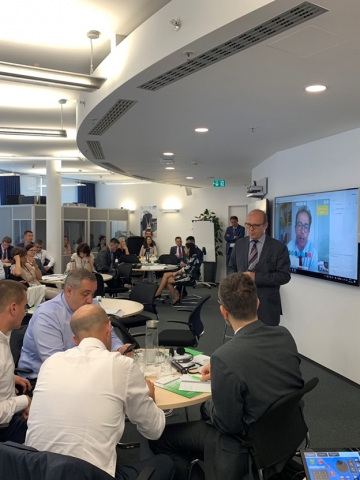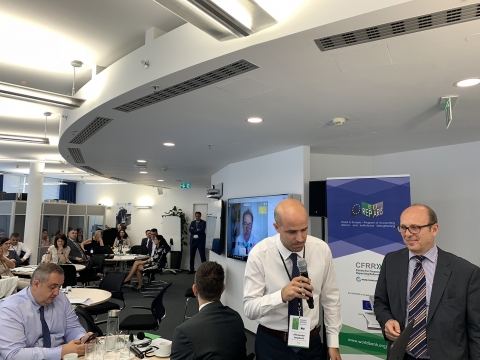The Financial Reporting Community of Practice met on July 3-4, 2019, in Vienna, to take stock of progress on the alignment of the participating countries’ legal frameworks to the EU acquis and the strengthening of institutions.
The workshop commenced with a welcoming remarks by Adenike Oyeyiola, Practice Manager, Governance Practice, who highlighted the importance of financial reporting reforms in the region and the continuous efforts of the World Bank to support the development of participating countries. She also thanked the European Commission for their financial contribution, and for being long standing technical partners.
Mr. Alain Deckers, Head of the Corporate Reporting Unit and Credit Agencies at DG FISMA, European Commission, described possible changes in EU law in terms of non-financial reporting, including sustainability reporting. These changes are subject to a decision once the new Commission is in place. He indicated that two most widely-discussed topics are digitalization of information and sustainability, which are likely to result in changes to existing directives. These two topics are more relevant for public and listed companies, it is also relevant to engagement with rather than for SMEs and candidate countries will have to align their legal framework with the amendments to the directives. He mentioned that listed companies will have to progressively tag information in their financial statements to make this information more accessible.
Other country specific presentations are as follows:
Montenegro: Ana Krsmanovic, Assistant Minister, Ministry of Finance, and Mladen Vlahović, Head of the Public Oversight, introduced the auditing framework in Montenegro and described the initial steps of the audit public oversight system. The auditing law is mostly aligned with EU Law, however, further efforts need to be made in terms of institutional strengthening (see attached).
Albania: Dritan Fino, Head of the Public Oversight Body in Albania, presented Albania’s framework for implementing the EU Audit Regulation that defines how Public Oversight Systems must function in the EU. Albania appears to have built a sizeable team, with highly experienced former auditors. The presentation was comprehensive and well received by participants (see attached).
Serbia: Aleksandar Janjusevic, representing the Ministry of Finance of Serbia, discussed the challenges in implementing the accounting law, and described a resistance to change from stakeholders. The latest changes in the Law on Accounting date back to 2013, and several discussions are taking place on required standards for micro and small companies. While the profession advocates mandating the IFRS for SMEs for micro and small, the Ministry would like mandatory application only for companies that are medium-sized and larger.
The CFRR team presented three sessions to inform participants about the potential direction the next EU-REPARIS program’s activities may take and presented new tools to measure the progress made under the several topics that are relevant to the Accounting and Auditing ROSC. Accountants as Catalysts for Growth (A4G) initiative, which supports the growing SMEs sector. The program aims at developing the capacity of accountants and other advisers to support SMEs as advisors. Participants discussed and reacted to the newly issued ROSC A&A indicators, which are foreseen to be used by the team to obtain a baseline for the EU REPARIS II program.
The CFRR team also gathered feedback on participants’ priorities for country level and regional activities (see attached). The team will reflect on these requests while also ensuring consistency with the objectives of the EDIF platform and the EU, with a strong focus on assistance to the SME sector and alignment with the EU’s Acquis Communautaire.
Participants provided good feedback, found the discussion format very productive, and were happy for the opportunity to exchange experiences with other countries and to work collaboratively with other country stakeholders in a context that facilitated discussions and consensus building.
Next steps:
- The team will prepare a format to systematize the review of accounting and auditing directives and regulation, including finalizing the review of the concordance tables in for Kosovo, Montenegro, and North Macedonia;
- The next FRCoP will be organized in early December and will discuss the role of the accountancy profession in helping SMEs and its regulation by the state. It will also look at country level alignment with the EU Accounting and Auditing Directives, and a regional draft action plan for the 6 countries of the W. Balkans that will serve the implementation of the next iteration of EU-REPARIS; and
- The team will build on the feedback provided to prepare the new EU-REPARIS program.

